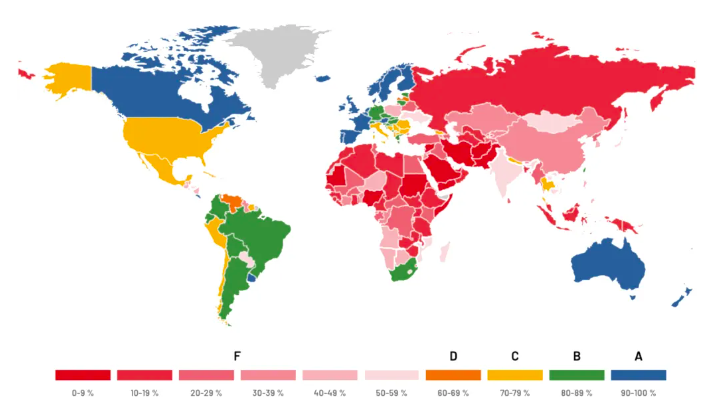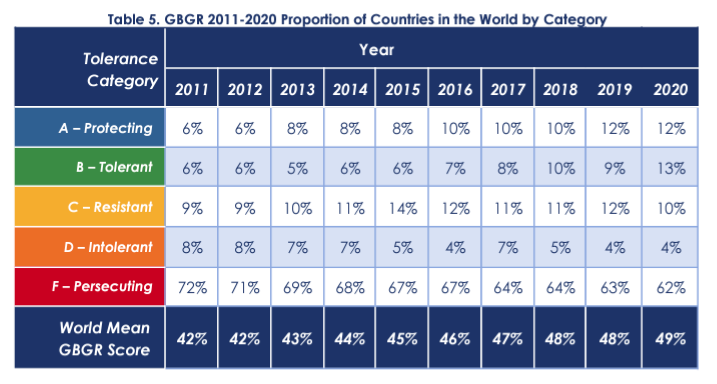U.S. drops to “C” grade on global LGBTQ+ rights scorecard
The United States has scored a middling “C-level” rating in lesbian, gay, and bisexual human rights in a study of queer rights across the globe from 2011 to 2020. The 2020 “C” score for the U.S. represents a decline from its higher “B” score in 2016, ranking the U.S. 31 out of 204 world countries overall. The U.S. has also scored a consistent “F” on trans rights throughout the study’s span.
These scores come from the Franklin & Marshall Global Barometers Report, an annual study that measures LGBTQ+ rights in 204 world territories and countries on five different dimensions: anti-LGBTQ+ laws, political and cultural practices, LGBTQ+ rights advocacy, anti-discrimination protections, and violent persecution. The final scores rely on reporting from governmental and non-governmental organizations, media coverage as well as surveys from over 167,000 LGBTQ+ people worldwide.
After Russia invaded Ukraine, the United States suspended operations in Kyiv. But they didn’t stop helping Americans who needed them – especially the queer community.
The report scored each country’s LGB and T rights, separately, with one of five scores: A for “protecting” queer rights, B for “tolerant” of them, C for “resistant” to queer rights, D for “intolerant,” and “F” for “persecuting.”

While the U.S. currently has a “C” for its LGB rights record, Susan Dicklitch-Nelson, a professor of government at Franklin & Marshall College who founded the study, told The 19ththat the U.S. will likely score an “F” in the years to come because of the recent wave of anti-LGBTQ+ legislation targeting queer people in public life.
“With the anti-drag laws that they have in Tennessee and in Florida, a lot of LGBT rights organizations are not able to peacefully or safely assemble, or pride events are not allowed by the state,” she said. “And do security forces provide protection [for] LGBT Pride participants? Again, that varies . . . depending on state.”
The study gave 62% of world countries an F on LGB rights. Only 35% of countries got a C-level grade or higher on LGB rights. All countries and territories that allowed for same-sex marriage scored either an A or a B on LGB rights by 2020, except for the United States.
The study found that countries and territories with higher levels of democratic rights tend to have more rights for LGBTQ+ individuals. It also found that most persecuting world regions continue to be in the Middle East and North Africa.
Only 10 countries have consistently scored an A on LGB rights from 2011-2020: Belgium, Canada, Denmark, England, Luxembourg, Norway, Scotland, Spain, Sweden, and Uruguay.

However, the study also had some good news from the global perspective: More countries are moving from lower LGB scores to higher scores. From 2011 to 2020, 24 countries — including the U.S. legalized — same-sex marriage equality. Eight other countries decriminalized homosexuality, bringing the total number of countries that criminalize homosexuality to 71.
As for trans rights, 70% of all countries got an F, and only 24% scored a C or higher. The U.S. has consistently scored an F on trans rights because of laws against the trans community in different states and continued violence and political rhetoric against trans people.
While trans rights improved somewhat globally over the 10-year span of the study, international scores overall have stayed low largely due to violence against trans people and arbitrary arrests for gender non-conformity.